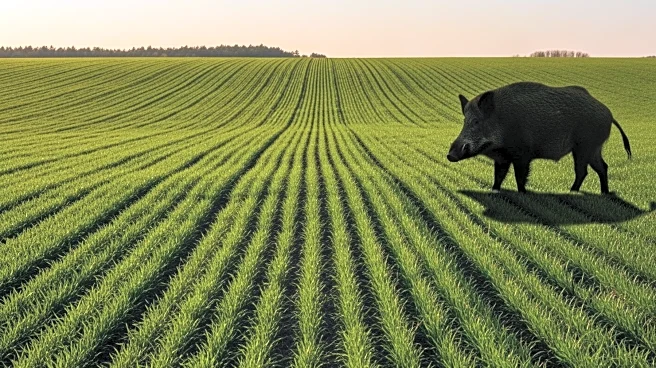What's Happening?
Brazilian agribusiness is under significant threat due to the uncontrolled growth of wild boars, which are causing extensive damage to crops and posing risks to livestock and human health. Originally introduced
in the 1980s for exotic meat production, these animals have escaped and proliferated across Brazil, now numbering over 1 million. They are present in more than 20 states, including Santa Catarina, Rio Grande do Sul, Paraná, Mato Grosso do Sul, and São Paulo. The wild boars are known for their rapid reproduction and adaptability, leading to severe agricultural losses, particularly in corn, soybean, and bean fields. Additionally, they are vectors for diseases such as classical swine fever and leptospirosis, which threaten pork production and can cross-transmit to humans.
Why It's Important?
The wild boar invasion represents a significant challenge for Brazilian agribusiness, a key sector of the country's economy. The destruction of crops and the potential spread of diseases could lead to substantial economic losses, estimated at over R$1 billion. This situation threatens food security and the livelihoods of farmers, especially small and medium-sized producers who lack the resources to manage the problem effectively. The environmental impact is also considerable, as wild boars disrupt ecosystems, prey on native species, and contribute to soil erosion. The need for coordinated national policies and effective management strategies is urgent to prevent further damage and ensure the sustainability of Brazil's agricultural sector.
What's Next?
Efforts to control the wild boar population face logistical, legal, and environmental challenges. While the Brazilian Institute of Environment and Renewable Natural Resources (IBAMA) authorizes controlled culling, the process requires registered hunters and specific licenses, which complicates management efforts. There is growing pressure from agricultural sector parliamentarians for a unified national control plan, including compensation for affected producers and incentives for sustainable management. The Confederation of Agriculture and Livestock of Brazil (CNA) advocates for the creation of a specific fund for emergency actions and awareness campaigns. Without immediate action, the wild boar invasion is likely to continue growing, exacerbating the threat to Brazil's economy and biodiversity.
Beyond the Headlines
The wild boar invasion highlights broader issues of invasive species management and environmental conservation in Brazil. The lack of natural predators and the adaptability of these animals underscore the challenges of maintaining ecological balance in diverse biomes. The situation calls for a reevaluation of policies regarding invasive species and the development of integrated strategies that involve local communities, government agencies, and environmental organizations. Addressing the wild boar problem could serve as a model for tackling similar environmental challenges in the future, emphasizing the importance of proactive and collaborative approaches to conservation.








